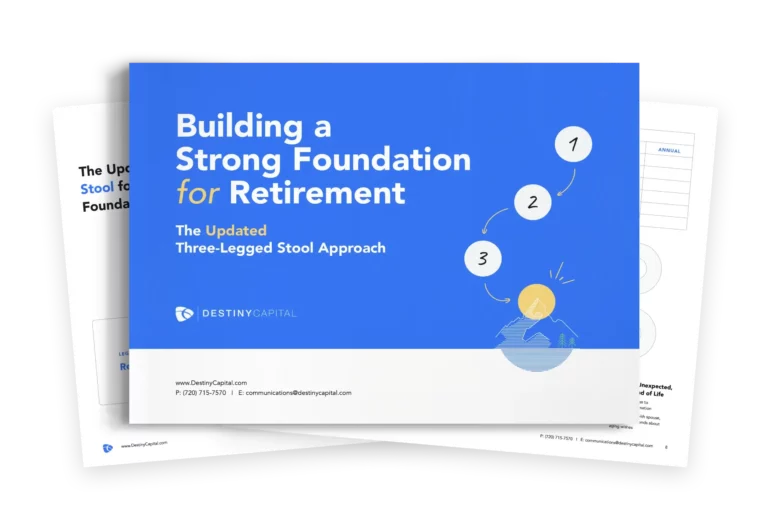Determining the Best Time to Retire: A Comprehensive Guide
You’ve worked hard, saved smart, and now it’s time to tackle one last question: When is the right time to retire?
The answer may surprise you.
Deciding when to retire is one of the most impactful choices you’ll make, shaping everything from your finances to your lifestyle and well-being. While leaving the workforce can be an exciting new chapter, choosing the right moment takes careful thought, planning, and self-reflection. Here in Colorado, where the average retirement age is 65, many of us wonder when to make the leap. The truth? There’s no one-size-fits-all answer, but there are some strategies and considerations to help figure out your ideal retirement timing.
Financial Planning and Readiness: Assessing Your Savings and Income Streams
Your finances are the foundation of any retirement planning strategy. Concerned that you might not have enough to retire? You’re not alone. Only 28% of workers and 32% of retirees feel confident about their financial future.
Building a solid financial foundation—one that can sustain you for 20-30 years—is essential. Let’s break down the key financial areas you’ll want to evaluate to determine your own readiness.
Social Security
As of 2024, the average Social Security benefit is around $1,862 per month. For most, it replaces just 40% of pre-retirement income, which means you’ll likely need additional income sources, like investments or pensions, to support your lifestyle.
The good news? Colorado offers a few tax breaks. State residents aged 65 and older can deduct federally taxable Social Security benefits from their state income. For those between 55 and 64, Colorado also allows deductions on up to $20,000 of retirement income, including Social Security—potentially helping you sustain your savings even longer.
Savings and Investments
Retirement savings—whether in 401(k)s, IRAs, or other investments—are a crucial component when considering total income after you leave the workforce. A common approach is to withdraw around 4% per year to help sustain your savings throughout your life. While the guideline provides a starting point, the 4% rule may not work for everyone. An experienced wealth management or financial planning advisor will understand your specific circumstances to bring big-picture insight into your approach. They’ll consider factors like market conditions, lifestyle needs, and your unique risk tolerance to help you determine the most sustainable withdrawal rate for your specific circumstances.
Spending Needs and Inflation
Your spending needs in retirement may differ from what they are now. While some expenses, like commuting or work attire, may decrease, others, such as travel or healthcare, might rise. A general rule of thumb is to aim to replace about 70-80% of your pre-retirement income. And remember, inflation affects retirement costs over time, so a $100,000 budget today might need to be closer to $120,000 in a decade, assuming a 2% inflation rate.
Health Considerations: How Health Impacts When to Retire
Health status is often a wild card in retirement planning. Your health can affect not only your quality of life when you retire but also your finances. Here’s how to think about health as you plan:
Medical Coverage & Expenses
Having a solid medical coverage plan is essential for retirement readiness. Medicare coverage kicks in at 65, so if you’re eyeing early retirement, you may need bridge insurance to cover the gap. Health Savings Accounts (HSAs) allow you to set aside pre-tax dollars for qualified healthcare expenses after retiring. Long-term care insurance is another smart option to consider early, as premiums tend to be lower when you’re younger and healthier.
Healthcare costs can be substantial. The average 65-year-old couple can expect to spend around $315,000 on healthcare alone, not including long-term care costs that Medicare won’t fully cover. Planning for these expenses now can help protect your retirement nest egg later.
Physical Well-Being and Lifestyle
Physical health also comes into play when deciding when to retire. Your health status and its potential trajectory can help determine the right time to leap into this new chapter of your life. Retiring while still active can allow you to enjoy various activities, like travel, hiking, or other pursuits. If you have plans to go on adventures after you retire, you may want to consider leaving your job earlier while you’re still physically healthy, assuming your financial health supports that goal. An experienced wealth management advisor can help ensure you have adequate resources to maintain this lifestyle.
Mental Preparedness
Retirement isn’t just a financial transition; it’s a profound lifestyle shift. Many people derive a strong sense of purpose from their careers, and leaving the workforce behind can be a significant emotional adjustment. Ensuring you’re mentally and emotionally ready for this next phase can be just as important as your financial preparedness.
Unfortunately, many people overlook this crucial aspect of retirement planning. An AARP report found that 57 percent of retirees and 41 percent of non-retired adults had never thought about planning for their emotional needs when they stopped working. Nearly half of retired adults said they had given no thought to finding ways to feel fulfilled.
Proactively addressing your mental health can help ensure a smoother transition to life after the grind. Finding ways to stay mentally engaged through part-time work, volunteering, or pursuing new hobbies can help ease the transition and ensure you thrive in this new chapter of your life.
Lifestyle Goals: Aligning Retiring with Personal Aspirations
Retirement planning isn’t just about crunching the numbers to pinpoint the right time to leave your job. Your dreams and personal goals are equally important considerations. Here’s how to include them in the plan:
Envision Your Ideal Lifestyle
Take time to reflect on what you want your retirement to look like. Do you picture yourself traveling extensively? Volunteering or working part-time? Staying close to family or relocating? All these factors impact how much money you’ll need and when the right time to retire might be.
Consider Your Spouse or Partner’s Plans
If you have a partner, coordinating retirement timing and goals can simplify the transition and avoid potential conflicts. Discussing your aspirations, whether relocating, taking up new hobbies, or downsizing, can help create a unified retirement vision.
Create a Purpose-Driven Schedule
Extra free time is a gift, but it can also increase the need to bring new, fulfilling activities to your schedule. Pursuing different hobbies and interests can help you have peace of mind that retiring will bring enjoyment and satisfaction.
Create a Personalized Retirement Timeline: Destiny Capital Can Help
Remember, the goal isn’t just to retire – it’s to retire well, on your own terms, when the time is right for you. Ultimately, the best time to retire is when you feel financially secure, prepared for the health-related aspects, and ready to enjoy the life you’ve envisioned. You can create a retirement timeline that aligns with your unique needs by carefully evaluating your savings, considering your health, and defining your personal aspirations.
If you’re ready to create a personalized retirement strategy, Destiny Capital can help. Our team of financial advisors specializes in partnering with clients as they make informed financial planning and retirement decisions tailored to their specific situation. Schedule a consultation with us today to learn how we can create a retirement timeline that aligns with your goals.
Share this
Stay Ahead with Smart Investments
Learn how to invest wisely and minimize risks to protect your retirement savings.
Achieve Your Retirement Goals
Get personalized advice to meet your retirement goals. Book your call with Destiny Capital now.




